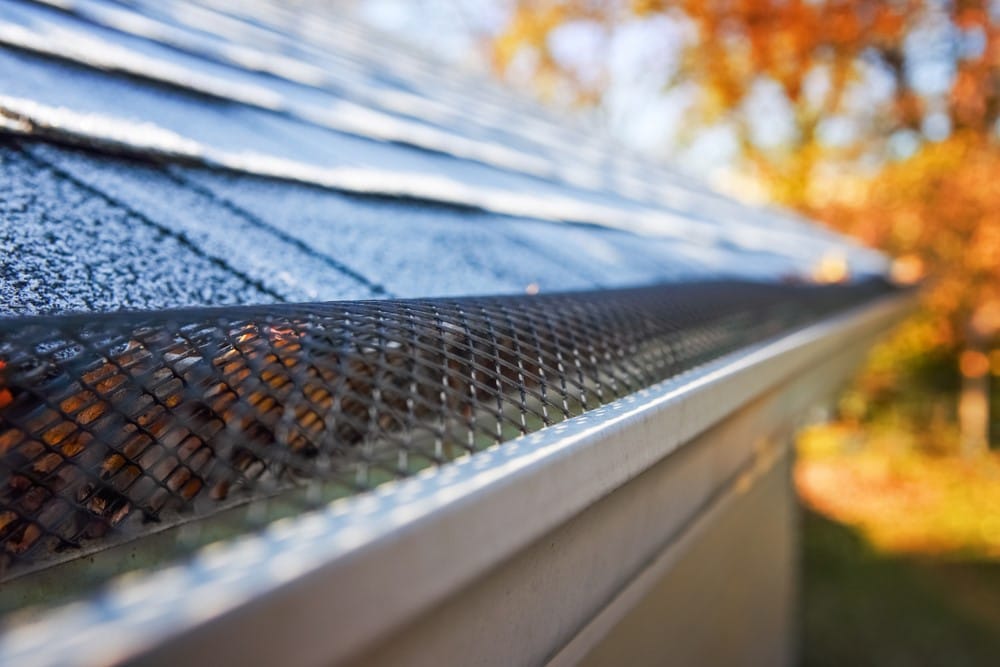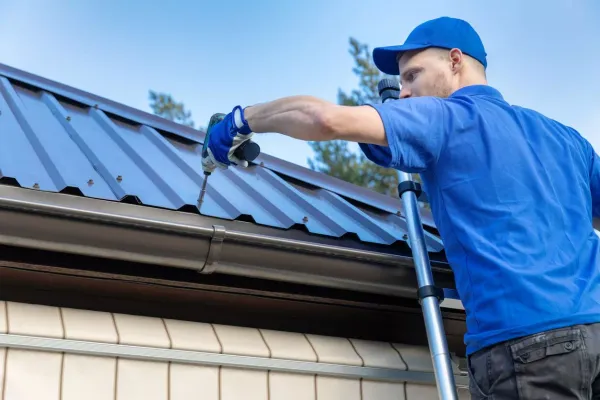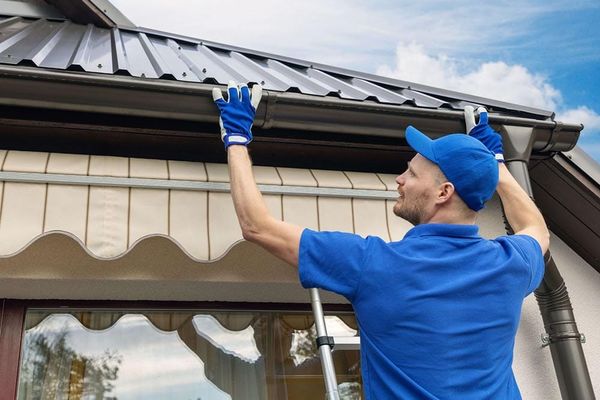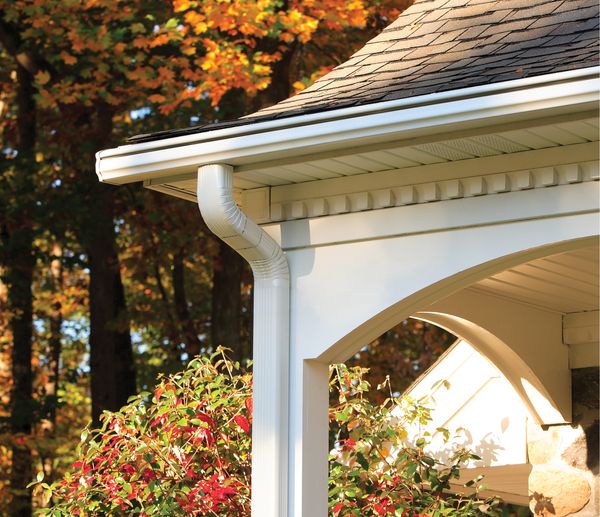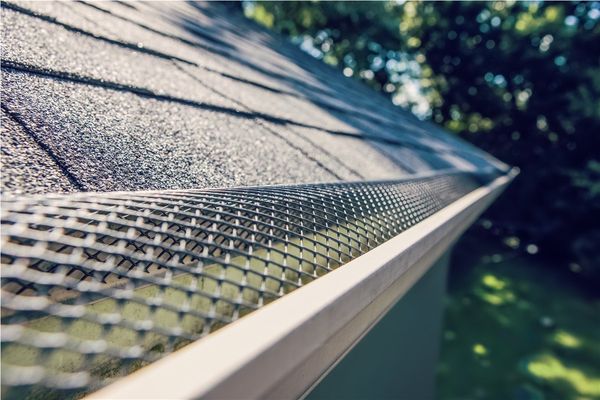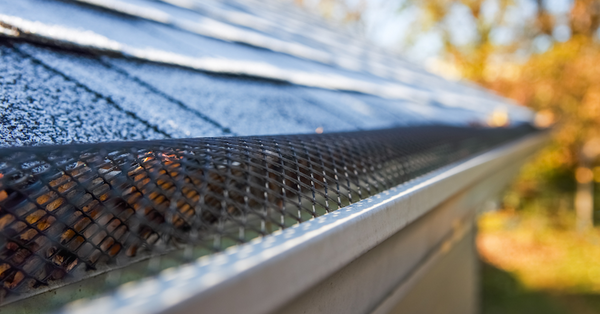If you’ve ever done a quick search for gutter guards you would have noticed that the market is virtually flooded with different varieties of gutter protection.
From solid gutter guards to micro mesh, sponge inserts to leaf filters. How do you possibly choose between all these options?
Well, let’s have a closer look at each of these designs and perhaps help you decide which one would work best for you.
Keep in mind the age-old saying that you get what you pay for often applies to these kinds of scenarios, and the cheapest option is unlikely to be the best all-rounder when it comes to gutter protection.
Option #1 Screen Gutter Guard
Screen gutter guards utilize a mesh or perforated surface to block larger debris while allowing water to flow through.
Made of various metals such as aluminum or vinyl, they attach to the top of your existing gutter system. Depending on the design, the gutter screen may simply clip on, or it might require fasteners to hold it into place.
Screens are typically purchased from a home improvement or gutter supply store. They may be installed by the homeowner, a handyman or a roofer. Often made of cheaper materials, they usually do not prove to be a long-lasting product or come with a warranty.
Screens may be pretty good at keeping out larger debris, but smaller items like seeds, sticks, spinners, and tassels tend to become lodged in the openings and require frequent cleaning to prevent gutter overflow.
Why you might want to consider it
As mentioned, they’re pretty effective at keeping large particles out, so if you only have trees that shed large leaves and do not overhang the house, they might be an inexpensive option.
Common issues with these types of gutter guards
Good at keeping the big stuff out - not so much the smaller things…
Smaller particles like maple seeds or ash needles may still find their way into your gutter. Periodic cleaning of your gutters may thus still be needed.
The filter itself also requires occasional cleaning. That’s because, over time, debris may accumulate on top of the mesh surface or become lodged in the openings, rendering the leaf guard useless.
Option #2 The Mesh Guard
Mesh gutter guards are of similar design to gutter screens but have smaller holes, to better block debris from entering the gutter.
There are numerous brands and types available online or at home supply stores. These are usually made of cheaper materials and installed as a DIY project or as a side product of a gutter or roof installer.
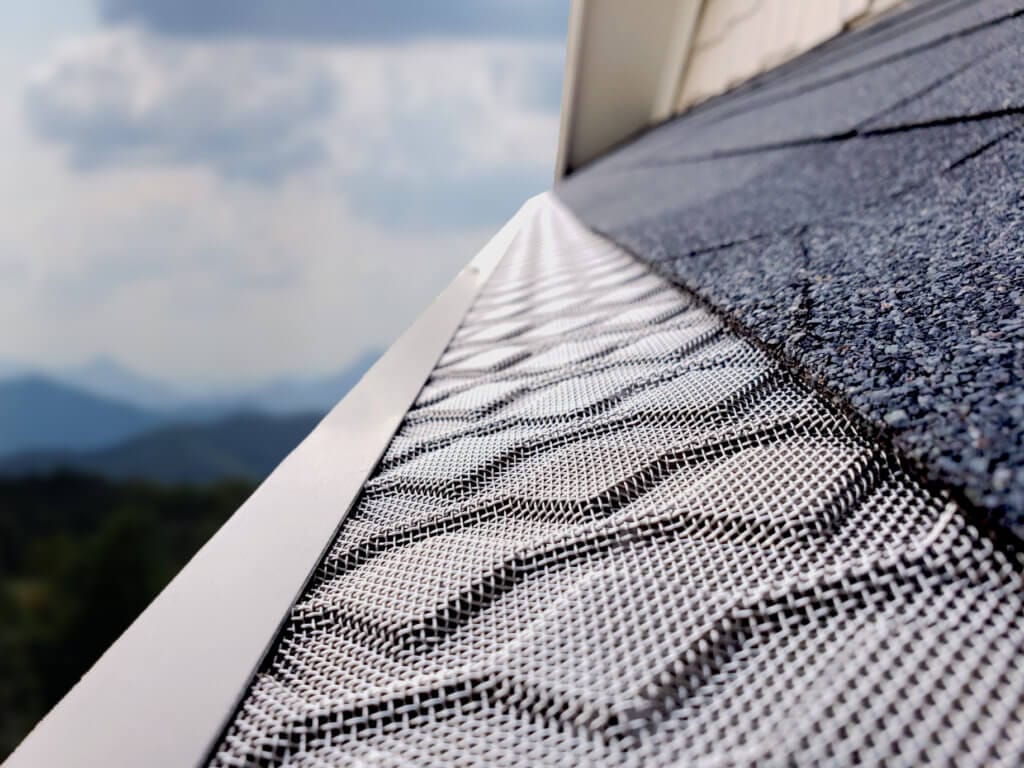
Why you might want to consider it:
It will give you general protection from larger debris like twigs and leaves. It will also act as a barrier to keep critters from nesting in your gutter system, which would also clog up the entire gutter system.
They are also relatively easy to install and generally less expensive, making them a convenient choice for homeowners seeking a practical solution.
Common issues with these types of gutter guards
Cleaning required - similar to screen guards, mesh guards may still permit smaller debris to enter your gutter, albeit less frequently. So periodic cleaning will still be needed. As debris falls and collects on top of the mesh, it will block water entry and cause gutter overflow unless kept clean.
Option #3 The Micro Mesh Guard
Micro-mesh gutter guards contain tightly woven, very fine holes that can block debris as fine as shingle grit and pollen from entering the gutter. Its main characteristic is keeping even small debris from getting in the gutter.
Because it’s so effective at keeping out the small and the big stuff, there will be little need to clean the gutter system itself.
While the gutter remains clean, the mesh itself can become clogged as debris sets on top and decays, or settles into and blocks the small openings.
Depending on the brand, these can be made of higher quality material or lesser quality material. Professionally installed micro mesh leaf filters can be quite expensive.
Why you might want to consider it:
Because it’s so effective at keeping out the small and the big stuff, there will be little need to clean the gutter system itself.
Common issues with these types of gutter guards
Installing micro-mesh guards may require more expertise and effort compared to standard mesh guards. Professional installation is probably the way to go. This also means that there can be a substantial initial cost.
A bigger problem than that is that the micromesh tends to get clogged pretty quickly. As the perforated holes are extremely fine, leaves and other small debris like seeds, moss, and sap get stuck in the openings pretty easily.
Many micro mesh leaf filter systems create a shelf effect that collects sticks, stems, tassels, decaying leaves, and dirt. It is a textured surface that holds onto debris. Eventually, water can’t get through the piled-up debris and clogged mesh causing overflow.
This means that while you won’t have to worry about cleaning the gutter system itself, you'll probably have to climb a ladder now and then to clean the mesh guard itself. This can make the cost not worth it. Warranties typically only cover the gutter getting clogged, not the guard.
Option #4 Sponge Insert
A sponge insert is a foam-like insert placed inside gutters to act as a block for debris while allowing water to pass through. It’s the easiest of all gutter cover solutions as it simply lies inside your gutter itself.
Why you might want to consider it
Sponge inserts are easy to install and require no special tools or skills, making them accessible for homeowners looking for a DIY solution. They are also relatively affordable compared to other protection options, making them budget-friendly.
Common issues with these types of gutter guards
Sponge inserts are less effective at keeping fine debris out of your gutter compared to mesh or micro-mesh guards. While they provide some protection, they may not completely prevent clogs.
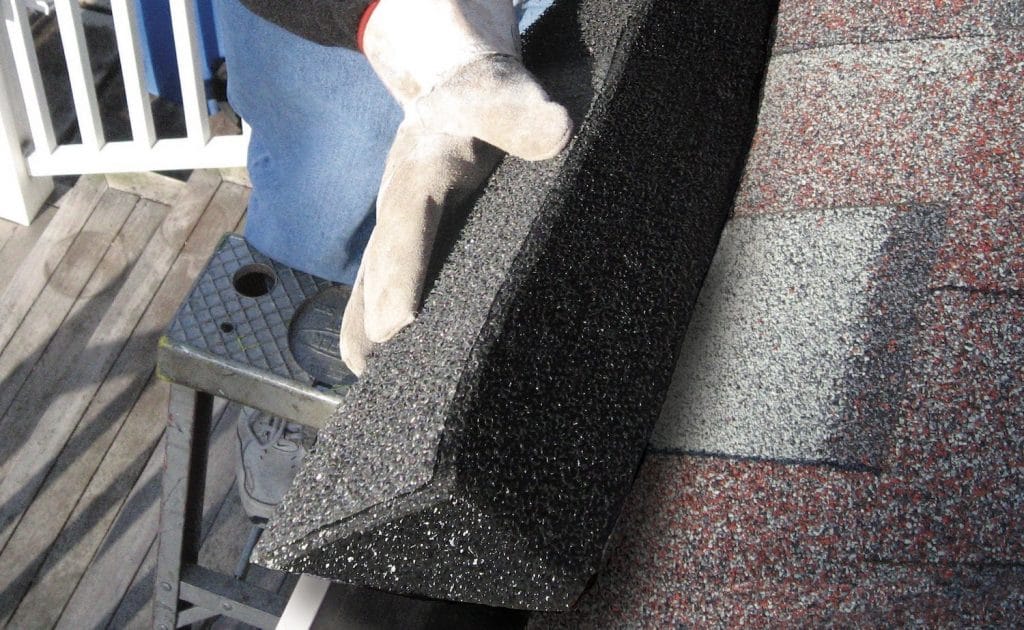
Because the foam fills the gutter, it lowers the water-carrying capacity of the gutter. During a hard rain, the foam hinders the water from moving quickly through the gutter system to the downspout.
Small debris, roof granules, dirt, and pollen get trapped in the foam and slowly make their way to the bottom of the gutter and since the water can’t move quickly through the gutter it fills the gutter with a nasty sludge.
These gutter guards also suffer from durability issues and break down quicker than other designs in severe weather and sun exposure.
To maintain their functionality, sponge inserts should be cleaned and replaced periodically, especially in areas with heavy debris accumulation.
Option #5 Solid Gutter Cover
A solid gutter cover is designed with a solid surface that completely shields the gutter, preventing debris from entering. Its main characteristic is comprehensive debris blockage, ensuring that all types of debris are kept out of the gutter system.
Designed to handle even heavy rain, they have a reverse curve that uses surface tension to collect all the water from the roof and direct it into the gutter and away from the home.
Why you might want to consider it:
Solid gutter covers are highly effective at keeping all types of debris out of your gutters, including leaves, twigs, pine needles, maple seeds, sweet gum balls, and oak tassels. This comprehensive protection ensures that your gutters remain clear and functional.
Because they are not designed to filter water through openings that can become clogged, they require minimal maintenance, reducing the need for frequent cleaning and maintenance efforts.
Solid gutter covers offer a proactive solution to prevent clogs that can lead to water damage and structural issues. They provide peace of mind, even in areas with heavy debris.
Common issues with these types of gutter guards
Higher Initial Investment: Solid gutter covers may have a slightly higher upfront installation cost compared to some other options. However, this investment is offset by reduced maintenance and long-term benefits.
There are many different designs, and not all have the best design options, so homework is needed in choosing the right solid gutter guard.
Advantage Gutter Guard(R) - Solid Gutter Cover
When considering gutter protection options, you need to weigh each product's pros and cons while considering your specific needs and preferences.
While other options may provide partial protection, the well-designed solid gutter cover offers comprehensive defense against debris. It handles heavy downpours, ensuring that your gutters remain free-flowing and your home stays protected.
But not all solid gutter covers are created equal. Some solid covers have design flaws that allow them to clog, have smaller water volume capacity, and may be made of inferior material.
Gutter Cover KC® has taken all these factors into account and has come up with the perfect ratio of functionality and affordability.
Their Advantage Gutter Guard(R) is a solid gutter guard that has been developed with over 20 years of experience by professionals who know a thing or two about gutter protection.
It harnesses surface tension to direct rainwater into your gutter while keeping all debris out. Best of all, it has a lifetime clog-free guarantee, meaning you’ll never have to climb your garden ladder to clean your gutter system again.
How Important Is The Right Material?
Gutter guards are available in a variety of materials, each with its own set of characteristics.
The choice of material impacts the product's durability, maintenance requirements, and overall performance. Here are some common materials used in gutter guards:
Aluminum
Aluminum gutter guards are lightweight, corrosion-resistant, and suitable for most climates. They are known for their durability and resistance to rust, making them a popular choice.
Stainless Steel
Stainless steel gutter guards are exceptionally durable and resistant to corrosion. They are an excellent choice for areas with heavy rainfall and debris.
Plastic
Plastic gutter guards are lightweight and affordable. However, they may not be as durable as metal options and may require replacement over time.
Copper
Copper gutter guards offer an elegant appearance and patina over time. They are often chosen for their aesthetic appeal and long-term durability.
Vinyl
Vinyl gutter guards are budget-friendly and easy to install. While they may not be as durable as metal options, they provide a cost-effective solution for basic protection.
A Final Word
While each type of gutter guard has its pros and cons, the clear winner will always be a proven solid gutter guard - fitted by professionals.
They keep all debris out of your gutter system, allowing for hassle-free rainwater dispersion, year-round.
But when looking for a solid gutter guard, do your research and go with professionals who will guarantee the craftsmanship of the highest quality, as discussed in this article.

